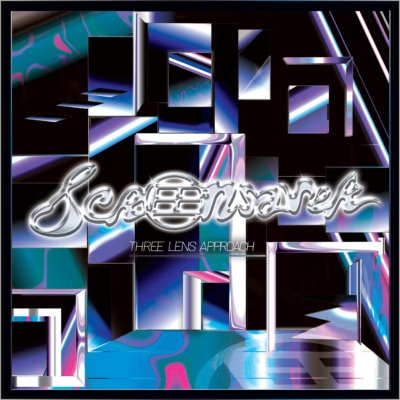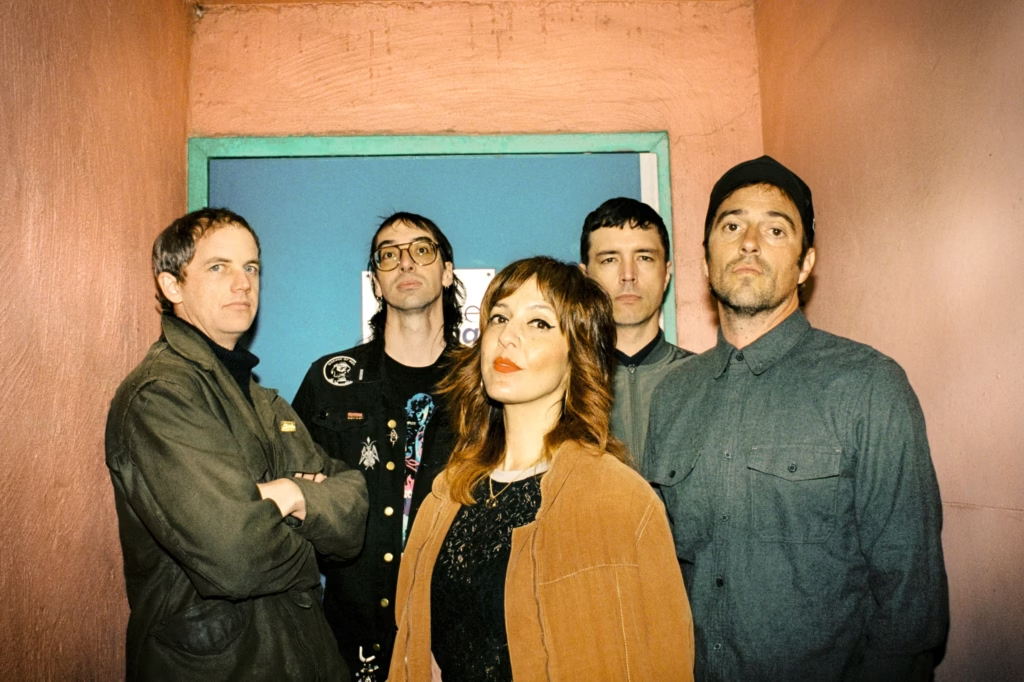Forming in Melbourne in mid-2019, darkwave post-punks Screensaver burst onto the scene with a barrage of vintage synthesizers and a jolty, gothic-tinged, angular sound. Their sense of urgency wasn’t confined to the studio either, with their first run of live shows making an impression and establishing them as an exciting new presence in the city’s alternative scene. Even when COVID-19 derailed their early momentum and pushed their debut album, 2021’s Expressions of Interest, into a largely shut-down music economy, the five-piece didn’t skip a beat.
As live shows returned in their city and eventually worldwide, the band kept writing toward a new album. By the time Decent Shapes dropped in October 2023, they were already developing ideas for their third record. Even now, as two-fifths of the band—lead vocalist Krystal Maynard and guitarist/keyboardist Chris Stephenson—speak to CONE about said third record, Three Lens Approach, they admit they’re already working on “four or five songs” for their fourth.
“We do not stop,” says Maynard with a wide-eyed, incredulous laugh. “I don’t think we can really help ourselves. It’s become pretty natural to us, and the most fun part of being in a band. There’s nothing quite like coming up with an idea on your own and then bringing that idea to life in the jam room with the rest of the band. Your shitty little iPhone recording has been brought to life. It was a thought two days ago, and now it’s alive.”

When it came to following up Decent Shapes, the band wasn’t overly self-conscious about carving their sound into too narrow a niche. Instead, they were more focused on exploring possibilities, experimenting, and chasing ideas down the rabbit hole. “I had demos of these repetitive Krautrock ideas,” explains Stephenson. “I didn’t know where it was headed, but it was a new direction that sort of manifested itself. Call it an accidental departure.”
He traces this unexpected shift back to the principles that guide his writing style. “I’m drawn to minimalism as a songwriting concept. I’m massively influenced by these movements and ideas that don’t necessarily align with aspects of pop songwriting like verses and choruses. Believe it or not, it pairs well with the way Krystal writes, which is from a much more traditional background.”
Maynard agrees, noting that being pushed into these unconventional spaces unlocks new creative territory. “What’s special about being put in a position like that is that you have to find ways to work in an environment you haven’t worked in before,” she says. “In that setting, a chorus can be anything you want it to be. You can change melodies over the same riff. It takes a bit of mental uncoupling, but you can be guided by your own kind of change rather than a musical one.”
She adds that this challenging process often yields the greatest reward: “The songs that have been the most uncomfortable and the most challenging to write around and within, like ‘Context is Everything’ and ‘Drip Feeding’, have ended up being the most interesting ones on the record.”
The band—rounded out by drummer James Beck, bassist Dorian Vary and keyboardist Jonnine Nokes—united in early 2025 to record Three Lens Approach with producer Julian Cue. Bringing in their most trusted collaborator, according to Stephenson, was a no-brainer.
“We’ve used Julian for all three albums, and he’s the most consistent throughline across all of them,” he says. “He’s got a specific talent and ear for [making] sure each component is being heard, and retaining the core sound of each musician in the band. It’s magical. He’s almost a member of the band at this point. Even though he’s behind the curtain, I’ll always make sure Julian’s part is credited, because it’s massive.”
Stephenson also chose the album’s title—a credit he also holds for Expressions of Interest and Decent Shapes. Building on Maynard’s suggestion to somehow incorporate the number three, he borrowed a term from the design industry to reflect a multifaceted approach. “It’s a bit corporate… which is a bit of a wank, really,” Maynard laughs. “When I started reading up on what the phrase means, however, I ended up finding it really appealing.”
The industry jargon of the album title ultimately proved to be a perfect metaphor for Maynard’s approach to lyricism. “A three lens approach is about approaching things from a different perspective,” Maynard continues. “The way I write my lyrics is from a different perspective. Whether it’s first or third person, I try to create a character with their own thoughts and feelings. That title really fed into that. I’m not sure if that was Chris’ intention, but it ended up working all the same.”
Self-described as an “anxiety-riddled” album, Three Lens Approach ambitiously swings between surging, electric dance grooves and noisy, snarling guitars. It charges out of the gates with the blistering “Executive Function,” driven relentlessly by Beck’s propulsive backbeat. From there, the record moves through neon-tinged new-wave on “Upstream” before hitting the vintage bass-heavy post-punk on “Telepathic Apathy.”
Maynard delivers a barking, belligerent vocal style throughout, recalling the likes of Carrie Brownstein and Jehnny Beth. She knows her singing isn’t for everyone, and she doesn’t care. “I like to maintain a bit of an edge,” she says. “I don’t ever want this band to be overly melodic. Those sort of post-punk bands exist, and I like them, but I don’t want that for us. It needs to maintain that angular nature, and be bound by that energy.”
When writing for the album, Maynard found herself repeatedly returning to a central theme: power. “Personal power, power as the collective, the power of authoritarian figures, government power, the power of political movements,” she says.
Maynard elaborates on how this theme shaped the album’s songs, using “The Wear and Tear of Living” as an example. “That song is very much about the exhaustion of existing in the modern world, and the social conditioning that we all have to achieve things, to make something of ourselves, whilst also just trying to survive. I personally feel those feelings, but I think it’s more speaking on behalf of a very tired humanity.”
With the rise of outspoken artists like Kneecap and Bob Vylan this year, the role of art as a form of protest—standing against tyranny and showing solidarity with the underclass and oppressed—has never felt more pressing. Both Maynard and Stephenson recognize this, and it’s seeping into Screensaver’s music, especially on Three Lens Approach. “We’re not exactly Rage Against the Machine,” Stephenson says, “but you can read enough between the lines.”
For Screensaver, music has never existed in a vacuum. It’s a mirror, a challenge, and a call to action. Maynard sums it up perfectly: “It’s a privilege to not be political,” she says. “If you care about other people, if you’re going to have empathy in the world right now, then you’re going to be political.”
Looking back, however, she acknowledges that wasn’t always the case in her career. “I was in bands in the past where you didn’t really want to go down that path because it was maybe a bit overdone. No-one wanted to talk about politics; it just wasn’t in the zeitgeist the way it is now. We’re reaching a time, however, where people are bored of complacency.” It’s with this notion that Three Lens Approach presents itself not only as an exciting new album, but a vital one.

